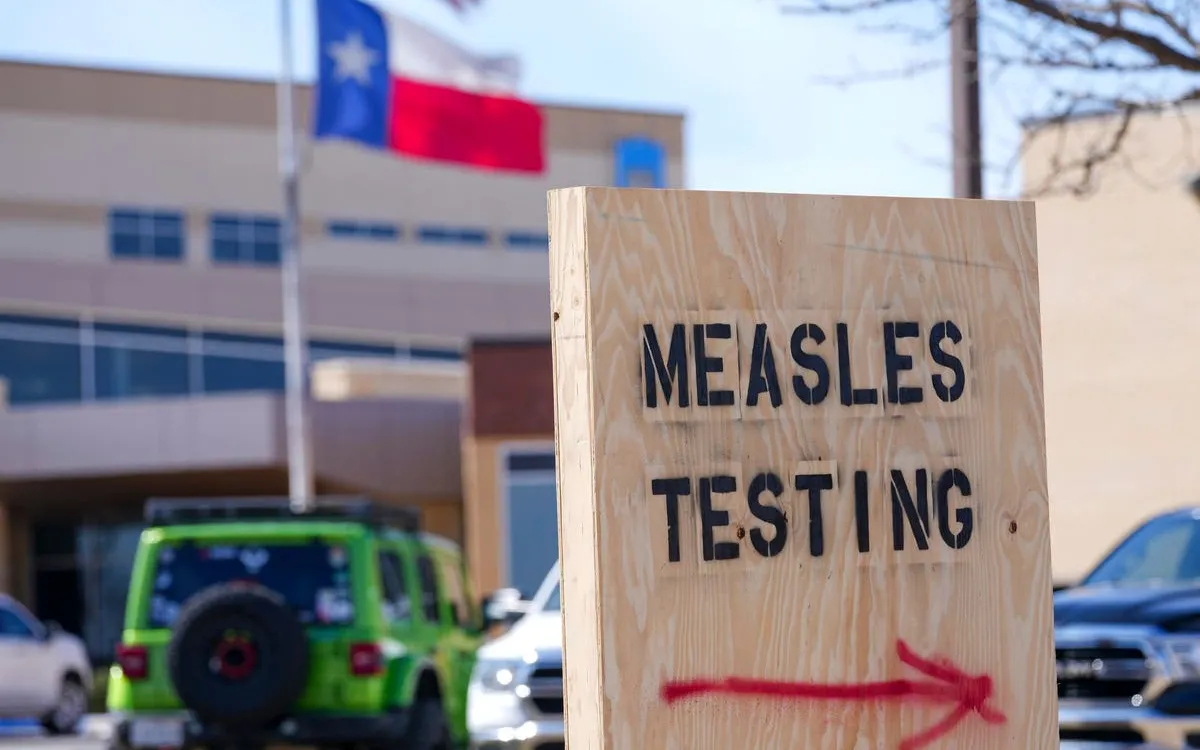
A significant measles outbreak in Texas has resulted in nearly 200 confirmed cases as of Friday. This alarming rise in infections comes on the heels of a reported case in New Mexico, where a deceased man tested positive for the virus. His official cause of death remains under investigation, highlighting the urgent need for public awareness regarding this highly contagious disease.
The majority of the measles cases in Texas are concentrated in Gaines County, a rural region located approximately an hour-and-a-half west of Lubbock. Specifically, 137 of the reported cases are from this area. Additional cases have emerged in surrounding counties: Terry County (29), Dawson County (9), Yoakum County (8), Dallam County (5), Martin County (3), Lubbock County (3), Ector County (2), and Lynn County (2).
The outbreak is impacting various age groups, with a significant number of cases reported among younger populations. Of the total infections, 89 cases have occurred in individuals aged five to 17. Additionally, 64 cases have been documented in children aged zero to four years, while 34 cases have been reported among adults over the age of 18. The ages of 11 patients remain unreported, underscoring the widespread nature of this outbreak.
In addition to Texas, New Mexico is also grappling with a measles outbreak, having reported 30 cases in Lea County, which borders Texas. Other states, including California, Alaska, Georgia, Kentucky, Florida, New Jersey, New York, and Rhode Island, have reported between one and nine cases, according to the CDC. This indicates a broader concern regarding the resurgence of measles across the United States.
Recognizing the symptoms of measles is vital for timely intervention. Common symptoms include fever, rash, cough, fatigue, runny nose, and red eyes. These symptoms typically appear 10 to 14 days after exposure to the virus, making it crucial for individuals to seek medical attention if they exhibit these signs.
Measles is exceptionally contagious. According to the CDC, it can spread from one person to up to nine others in close proximity. An infected individual can transmit the virus to others from four days before the rash appears to four days after. The virus can be spread through coughing, sneezing, and contact with infected surfaces, emphasizing the importance of vaccination and preventive measures.
Fortunately, there is a highly effective measles vaccine available. The measles, mumps, and rubella (MMR) vaccine has been in use for over fifty years and boasts about a 97% effectiveness rate in preventing measles with the standard two doses. It is typically administered to children, with the first dose given between 12 to 15 months and a second dose between four to six years old. For adults uncertain of their vaccination status, it is advisable to consult with healthcare professionals about potential revaccination, particularly for those vaccinated before 1968, as earlier vaccines may not provide adequate protection.
In light of the outbreak, RFK Jr. has expressed views that have evolved from describing the situation as “not unusual” to acknowledging its seriousness, stating that the outbreak in Texas serves as a “call to action for all of us to reaffirm our commitment to public health.” Despite being a vaccine skeptic, he acknowledged the role of vaccines in community immunity, though he stopped short of urging individuals to get vaccinated. His support for vitamin A as a treatment for measles has raised concerns among health experts, who warn that relying solely on this treatment poses risks, especially when compared to the proven effectiveness of the MMR vaccine.
Health officials are sounding alarms, with the Texas Department of State Health Services stating, “Due to the highly contagious nature of this disease, additional cases are likely to occur in the outbreak area and surrounding communities.” This warning underscores the necessity for public awareness and proactive health measures.
The current measles outbreak in Texas began in late January with just two cases, marking the state's largest outbreak of the virus in 30 years. According to a report from the Texas Department of State Health Services, 5.64% of Texas kindergarten students and 2.34% of seventh graders were not vaccinated against measles for the 2023-2024 school year. The CDC declared measles fully eliminated in the U.S. in 2000, with new cases typically arising from travelers returning from abroad. In 2024, there were a total of 285 measles cases reported across 33 states, highlighting the urgent need for continued vigilance against this preventable disease.